This post may contain affiliate links. See my disclosure policy.
What is the difference between avocado oil and olive oil, and which oil is the best healthier option for a family?
In this post, we break down the uses and health factors to determine which is the best of the best when it comes to two of the most nutrient-packed oils: Avocado Oil vs. Olive Oil.
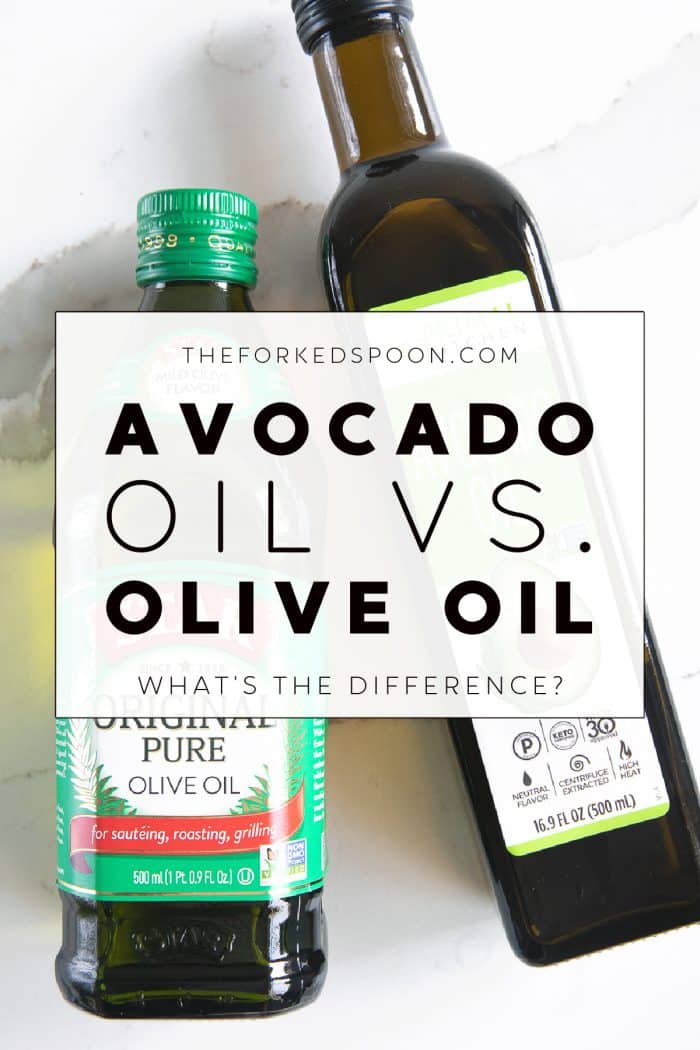
What is Olive Oil?
Olive oil is one of the most commonly used cooking oils in the U.S. today. It is made from pressed olives, a small stone fruit grown on trees.
Olives are native to the Mediterranean region, though nowadays approximately 98 percent of the world’s olive oil is grown and cultivated in 20 countries, making up what is known as the International Olive Oil Council.
Touted for its many potential health benefits, it’s used to dress salads, cook vegetables and meat, and even to bake.
Of course, not all olive oil is considered equal. You’ll find pure, light, extra virgin, or virgin olive oils on supermarket shelves. Check out this article outlining the differences between olive oil and extra virgin olive oil.
What is Avocado Oil?
Similarly, Avocado oil is pressed from the fruit of the avocado tree (Persea americana) and like olives, is classified as stone fruit. Native to Mexico and Central America, avocado is now cultivated in places throughout the world including the United States and New Zealand (source).
You’ll find two main types of avocado available for purchase – refined and unrefined. Unrefined avocado oil is cold-pressed, preserving its color and flavor, whereas refined avocado oil is most often extracted using heat and chemical solvents.
Avocado oil is extremely versatile and is most often used in culinary and skincare applications.
It also comes with an incredibly high smoke point: 250 °C (482 °F) for unrefined oil and 271 °C (520 °F) for refined avocado oil, making it versatile enough to make salad dressings, sear steaks, roast vegetables, or deep fry your favorite chicken.
A higher heat point simply means that the oil can endure higher cooking temperatures before breaking down and releasing potentially cancer-causing free radicals.
Saturated vs. Unsaturated Fat
If you already know all about the difference between saturated and unsaturated fat, feel free to skip over this refresher section.
What is Saturated Fat?
With few exceptions, saturated fats are typically solid when at room temperature. Often sourced from animal fat, like dairy and meat, you will also find higher amounts of saturated fatty acids in coconut oil, peanut oil, and palm oil.
There are different types of saturated fatty acids, each classified by their total number of carbon atoms. When a fatty acid is “saturated” this simply means that their carbon atoms are completely filled with hydrogen atoms. They are tightly packed with no double bonds between the fatty acids.
The debate is still ongoing whether saturated fats actually contribute to heart disease.
What is Unsaturated Fat?
Unlike saturated fats, unsaturated fats are loosely packed chains of fatty acids. When people think of “healthy fats” or “good fats” they usually think of unsaturated fat. These tend to be liquid at room temperature.
There are two main types of unsaturated fat:
- Monounsaturated Fats: Monounsaturated fats contain a single, double bond between two carbon atoms. Nuts, olive oil, and avocado oil are all high in monounsaturated fat. In the case of olive oil and avocado oil, they are high in the monounsaturated fatty acid called oleic acid, which is classified as a monounsaturated omega-9 fatty acid, or 18:1 cis-9, with the chemical formula, C18H34O2.
- Polyunsaturated Fats: Polyunsaturated fats contain multiple double bonds between carbon atoms and are available only via the food you eat. They consist of two main types: omega-3 fatty acids and omega-6 fatty acids.
Nutritional Comparison: Avocado Oil vs. Olive Oil
One tablespoon (15 ml) of Extra Virgin Olive Oil contains (source):
- Calories: 120
- Fat: 14 grams
- Saturated fat: 2 grams
- Monounsaturated fat: 10 grams
- Polyunsaturated fat: 1.5 grams
- Vitamin E: 33% of the Recommended Daily Value (RDV)
One tablespoon (15 ml) of Avocado Oil contains (source):
- Calories: 120
- Fat: 14 g
- Saturated fat: 2 grams
- Monounsaturated fat: 10 grams
- Polyunsaturated fat: 2 grams
- Vitamin E: 23% of the RDV
Both avocado oil and olive oil have the same total amount of calories and fat with nearly identical fatty acid profiles.
The most important thing to note, however, is that both avocado oil and olive oil are made up of primarily oleic acid (around 70%).
Research has shown that diets high in oleic-acid may help patients with type 1 or type 2 diabetes who are trying to maintain or lose weight (source). Another study found that diets high in monounsaturated fats had less inflammation and better insulin sensitivity when compared to those who ate diets high in saturated fats like butter, cheese, meat (source).
Which is Better? Avocado Oil vs. Olive Oil
Both olive oil and avocado oil contain a high level of vitamin E, with olive oil containing slightly more vitamin E when compared to avocado oil (source). Vitamin E is important because it is a fat-soluble antioxidant.
- What are antioxidants? Antioxidants help protect cells from the potentially disastrous and damaging effects of free radicals. It is thought that free radicals may contribute to the development of cancer and cardiovascular disease
Both oils are also high in the antioxidant, lutein. Studies have shown that lutein is particularly important in supporting eye health (source) and may even protect skin from damaging UV rays and visible light (source).
Avocado oil is especially well-known for its benefits to the skin.
One particular study has shown that a topical cream containing avocado oil and vitamin B12 improved symptoms of plaque psoriasis (source), while another study in animals found that avocado oil may aid in healing wounds by increasing collagen production and decreasing inflammation (source).
Usage and Terms
Avocado oil is a neutral-tasting oil, so it does not impart much flavor. This is great if you want the characteristics of the food you are cooking to shine through.
It may also make it easier to incorporate into a broader range of recipes, including bread or other baked goods where a neutral oil won’t impart any new flavors. It is also an excellent substitute for vegetable oil (i.e. canola oil, sunflower oil, or safflower oil).
Olive oil – particularly extra virgin olive oil – has a much stronger flavor and is typically associated with more savory dishes. As such, it is often used to make salad dressing, or when cooking meats and veggies, rather than being used in sweets such as brownies or breads. A strong antioxidant polyphenol called oleocanthal in olive oil is what gives you the slightly spicy flavor you find in high quality, extra virgin olive oils.
Olive oil is still suitable for high-heat cooking, but shouldn’t be heated to the same high temperatures that avocado oil can. This is especially true for EVOO. Olive oil blends or light olive oils are more refined and typically have a higher smoke point.
Olive oil seals in moisture and locks in flavor while cooking. Drizzling or rubbing your whole roast chicken, turkey, or simple baked chicken breasts before baking helps lock in moisture and passes the flavors of your seasoning through the oil and into the meat as opposed to simply dry rubbing the meat.
Avocado oil will definitely impart moisture, but since the flavor is mild, it won’t add much to the meat’s flavor profile on its own.
In low temperatures, either oil is acceptable as smoke point is not a factor, and the variance in flavor is not usually a deal-breaker because the oil will take on the dish’s flavors when paired with lively vegetables and herbs.
Which Oils Should I Buy?
Quality does make a difference. The health benefits of both oils also vary depending on the product’s quality and the refining process. The refining process of the oils can sometimes strip oil of many of its nutrients and antioxidants, so it’s best to buy higher quality oils sold in dark glass bottles.
As a general rule, extra-virgin and cold-pressed oils are the least refined and healthiest options.
Which Oil is the More Affordable?
Avocado oil is generally a bit more expensive than olive oil across the board. Cost greatly depends on the quality of the oil and how much it has been refined. Cheap varieties of both avocado and olive oil are available, but it is always worth investing in high-quality avocado or olive oil because then you will know that the oils will be the highest in available nutrients.
Time Magazine Online warns us against simply believing the “extra-virgin” label. Their experts encourage us to read deeper into the production and refinement of the oils labeled “extra-virgin”. “Extra-virgin” has become a marketing term and does not necessarily mean it is actually less refined.
Even a test of name brand olive oils by the National Consumers League in 2015 found that six of eleven oils tested from the market did not meet the criteria to actually be labeled “extra-virgin.” When it comes to knowing exactly what is in your oil or how it was refined, it is best to do the research upfront.
How Much Should I Use?
Olive and avocado oils are considered some of the healthiest oils to consume and play an essential role in a healthy diet. They should, however, be used sparingly.
All you need is a tablespoon or two when sautéing vegetables, searing meats like pork chops or steak, or stir-frying your favorite homemade Chinese takeout, like this personal favorite, moo goo gai pan.
Conclusion
So who takes the cake in the great olive oil and avocado oil debate? The truth is, both!
Both olive and avocado oils are excellent additions to your pantry. They are some of the best options over blended, highly refined and processed vegetable oils. Staying healthy can be as easy as substituting olive or avocado oil in place of vegetable oils like soybean, canola oil, or corn oil which can create inflammation in the body.
Just remember this list when you are purchasing oils for your daily use:
- Look for less-refined products, they contain more nutrients.
- Purchase cold-pressed and expeller-pressed, the best choices on the market.
- Think quality over quantity, prepare to spend the extra cash on getting the best quality oils from the top shelf.
- Avoid overdoing it! A little goes a long way with any type of cooking oil, and the healthiest meals use oils as if it were a delicacy.
The bottom line? When it comes to avocado oil and olive oil, it’s all about the flavor you want to impart on your food as their nutritional profiles, health benefits, and culinary abilities are significant in both.
With endless recipes and applications incorporating healthy fats and oils into your pantry will prove to be a game-changer and have you prepared for any recipe that may strike your fancy.
You May Also Enjoy,
Olive Oil vs. Extra Virgin Olive Oil: What’s the Difference?
Ghee vs. Butter: What’s the Difference?
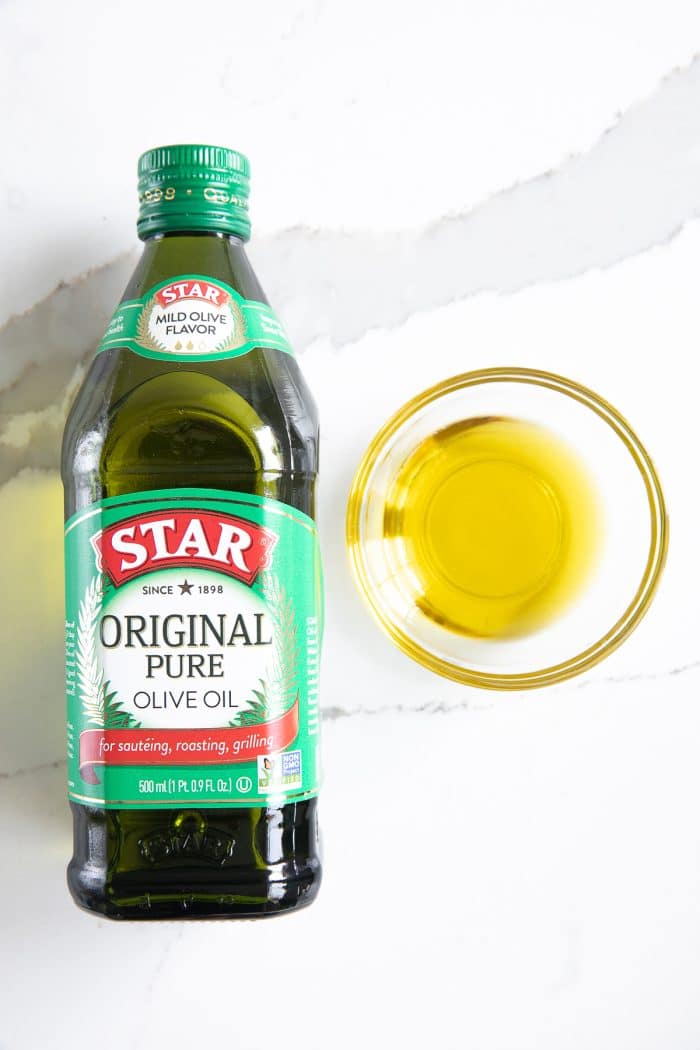
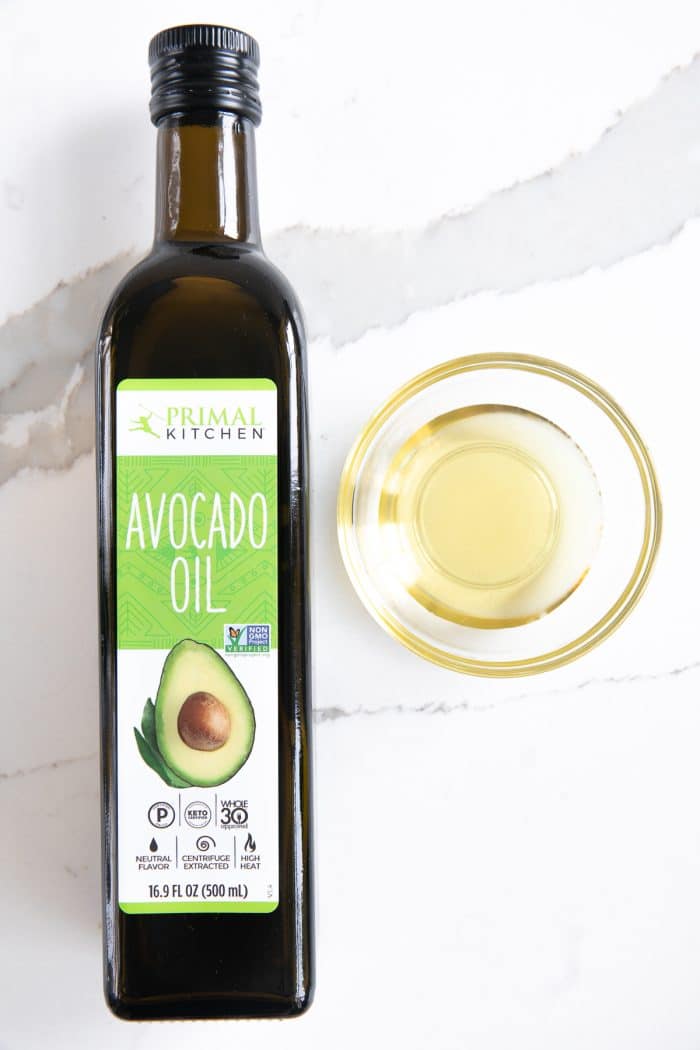

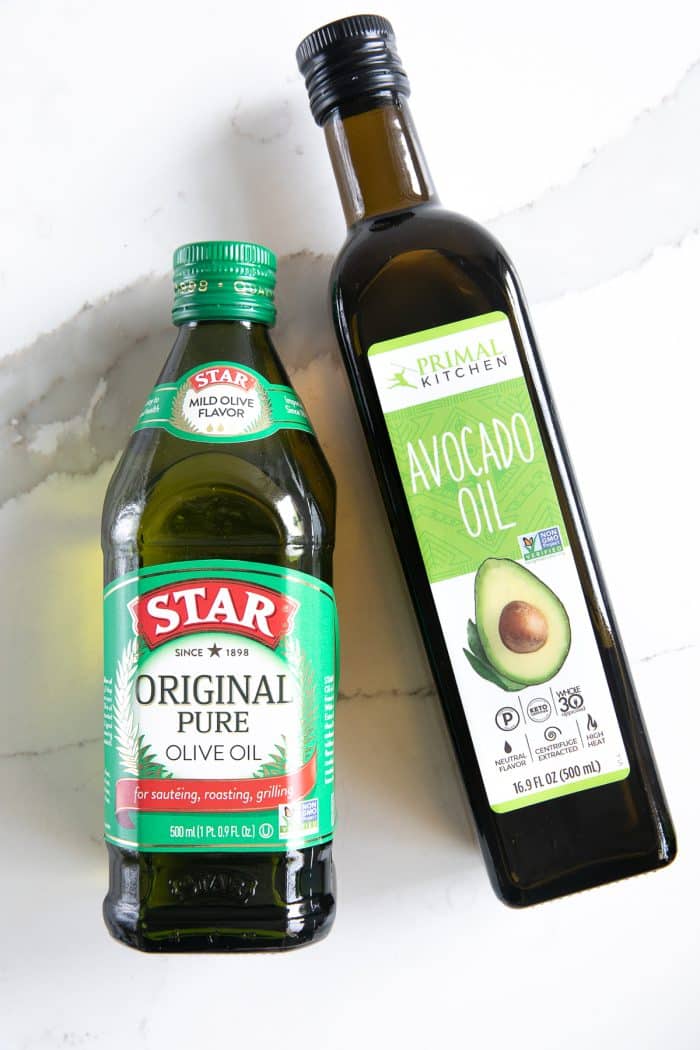

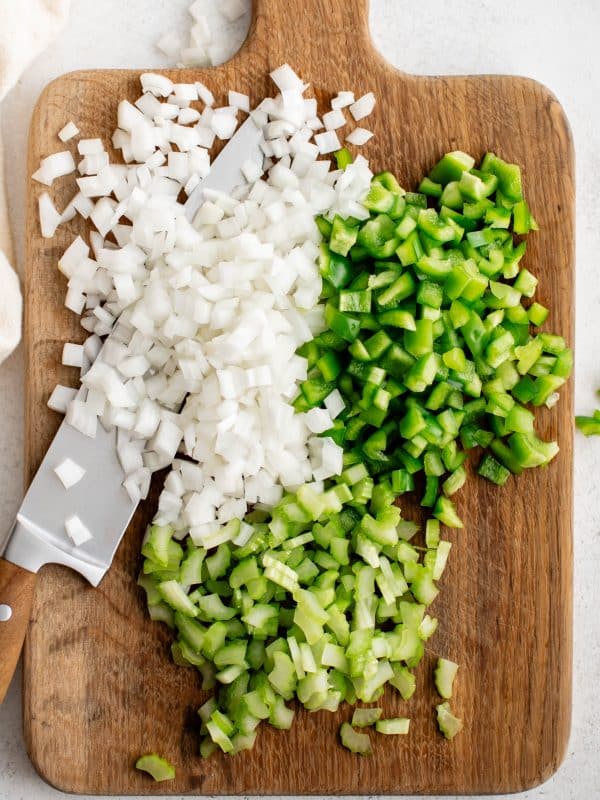
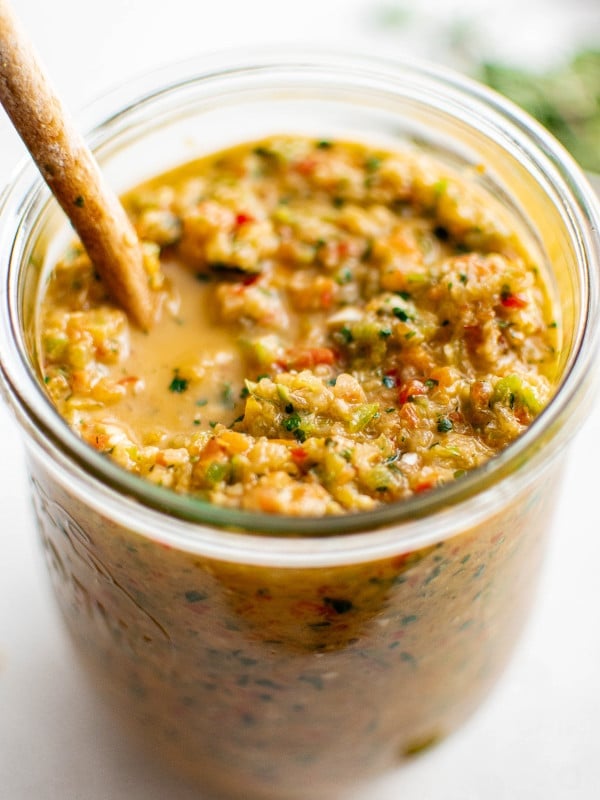










Great Information I use both but Avocado oil is very good for frying and No different test just like vegetable oil or corn oil.
Thank you for Very Informative Details.
I truly enjoyed reading this article b/c I use both oils practically everyday and I have jist.been diagnosed with type 2 diabetes. It was very informative and also reassuring. Thank you.
Thank you for the kind feedback, Juanita 🙂